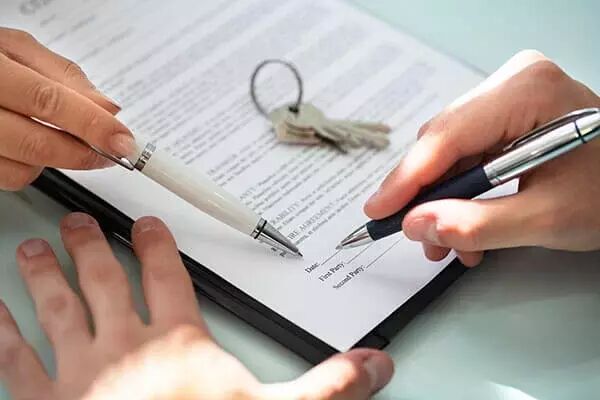The 15-Second Trick For Conveyancer
The 15-Second Trick For Conveyancer
Blog Article
Some Of Conveyancer
Table of ContentsThe Single Strategy To Use For ConveyancerSome Known Details About Conveyancer Some Known Factual Statements About Conveyancer The Main Principles Of Conveyancer
The costs are imposed based on the Regulation Culture's tariff standards. A Conveyancer ought to: At all times shield the rate of interest of his/her clients and in conformity with the signed Sale Arrangement; Keep all events notified of the progression on their transaction and notify both parties of the conveyancing treatment and procedures; Recommend the parties on the problems of the Sale Agreement, especially regarding suspensive conditions and commitments; Advise the seller on the cancellation of his bond, any kind of charges, notification durations and various other management costs which might impact the negotiation number; Obtain the seller's written directions prior to he/she, as the Conveyancer, concerns any guarantees in respect of the transaction; Do everything in his/her power to register the purchase on or as close as feasible to the day concurred to in the Sale Arrangement; Recommend both parties on their commitments in terms of their Sale Arrangement, so as to make sure that the transfer is not delayed unnecessarily; Consult with both events to sign the relevant documents connecting to the transaction Prepare the actions for lodgement with the utmost care, so as to make sure that they reduce the danger of a denial of the documentation by the relevant Deeds Computer registry; Educate both parties of the transfer on the day of registration; Account to both parties for finances connecting to the purchase within 2/ three days complying with effective enrollment of the transaction in the suitable Actions Registry.It's component of your conveyancer's job to collaborate a settlement time with the other side's lawful agent, throughout which time the residential or commercial property is formally transacted and all paperwork and cheques are turned over. Upon settlement, your conveyancer will make call with you and/or your actual estate agent to validate settlement and allow for tricks to be turned over.
Nobody wants to experience a difficult or frustrating circumstance when you ought to just be thrilled for your following action. This is where conveyancing can assist the process to move along efficiently. The function of a residential or commercial property conveyancer is to handle this lawful process of transferring the ownership and title of a home from the seller to the customer.
Yet attorneys commonly have a variety of locations they have experience in, with conveyancing perhaps being a field they do not practice in frequently. The advantage of using a residential or commercial property conveyancer is that property deals are what they accomplish on a regular basis. They understand the procedure inside and out and are very aware of it, making sure all relevant documentation is given and the process is precise and prompt.
The Single Strategy To Use For Conveyancer

Selecting an option for no various other factor than it's less expensive could create a lot more problems in the lengthy term with an unreliable or inefficient solution. Try to find a taken care of price solution so you understand exactly what the procedure will cost you and whether it suits your organized budget. Recommendations from close friends or family, or reviewing on the internet testimonials can likewise be useful in discovering a knowledgeable and reliable conveyancer.

Conveyancing solicitors and accredited conveyancers both oversee the conveyancing process. Conveyancer. Nevertheless, their specialist backgrounds vary. A conveyancing solicitor is an individual who is a fully qualified solicitor (as a participant of the Regulation Society) and that is experts in conveyancing. A building solicitor will normally tend to have experience in other legal locations also.

Some Known Incorrect Statements About Conveyancer
They liaise with numerous celebrations, including the estate representative, vendor's conveyancer, and neighborhood authorities. The conveyancing procedure begins when a deal on a building is accepted.
The customer's lawyer will certainly ensure the buyer is informed about the documentation and legal commitments. This phase involves clarifying the conveyancing expenses and describing the building info form. Being notified can prevent unpredicted problems as the procedure unfolds. Building searches serve an objective in the conveyancing process. The customer's solicitor organises these checks to reveal prospective issues with the residential property.
Regional authorities can provide insight right into neighboring future developments that may influence the residential or commercial property's value. Home mortgage lenders typically call for details searches before releasing a home loan deal. While some searches could appear optional, omitting them could result in unforeseen difficulties. A residential or commercial property's title actions stand for a historic document of its possession.
Conveyancer Things To Know Before You Get This
As soon go right here as a deal is accepted, the seller's lawyer prepares a draft agreement. This contract pack includes essential records like the building details type, the leasehold info form, and the installations and components form. The customer's conveyancer takes a look at these to make sure all the paperwork is regular with assumptions. At this stage, property regulation considerations arise, from shared access civil liberties to what fixtures come with the property.
On the other hand, if the vendor withdraws, they face charges. Both events settle on a conclusion day complying with the exchange - Conveyancer. On now, the buyer pays the staying equilibrium, and the seller transfers the building keys. There's commonly a void between exchange and completion for customers to settle details or make plans.
Report this page